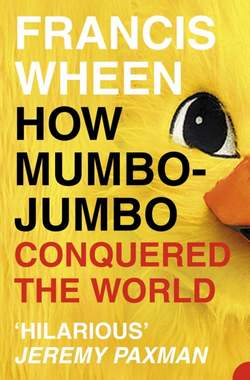Читать книгу How Mumbo-Jumbo Conquered the World: A Short History of Modern Delusions - Francis Wheen - Страница 10
4 The demolition merchants of reality
ОглавлениеYou propose then, Philo, said Cleanthes, to erect religious faith on philosophical scepticism; and you think that if certainty or evidence be expelled from every other subject of inquiry, it will all retire to these theological doctrines, and there acquire a superior force and authority. Whether your scepticism be as absolute and sincere as you pretend, we shall learn by and by, when the company breaks up: We shall then see, whether you go out at the door or the window; and whether you really doubt if your body has gravity, or can be injured by its fall; according to popular opinion, derived from our fallacious senses, and more fallacious experience.
DAVID HUME, Dialogues Concerning Natural Religion (1779)
Colin MacCabe, an obscure young Fellow of King’s College, Cambridge, was denied a lectureship by the English faculty’s appointments board in January 1981. Not the sort of news that would usually merit a paragraph in the university newspaper, let alone the national press: yet the rebuff to MacCabe, an expert on the novels of James Joyce and the films of Jean-Luc Godard, was reported on the front page of the Guardian. When MacCabe returned to England from a trip abroad a couple of days later, he found himself mobbed by reporters and photographers at Heathrow airport. His failure to gain tenure at the university provoked demonstrations in the streets of Cambridge and earnest debate on current affairs programmes. Newsweek cleared a page for the story (under the inevitable headline, ‘Unquiet Flow the Dons’), which it described as ‘one of the most extraordinary debates in the [university’s] eight-century history’:
Dons who normally confine their disputes to sherry parties leak damaging rumours about each other and threaten libel suits. Charges of academic sleaziness and intellectual persecution fly back and forth. Television crews roam King’s Parade to catch the carping of talkative academicians … Angry students began seeking to have the entire English faculty board suspended, and MacCabe sympathisers spoke of breaking away to form their own department.
Even some of his enemies agreed that MacCabe was an excellent scholar and teacher; but he was also a ‘post-structuralist’ who believed in analysing literature through study of its linguistic rules and cultural assumptions. Although MacCabe argued that these methods were no great radical departure from the traditions established by earlier generations of Cambridge dons – I. A. Richards and William Empson both undertook close formal analysis of the language of literary texts, while F. R. Leavis and Raymond Williams attempted to place novels within the general cultural history of the country – he did admit that it was the ‘enormous explosion of work in the mid-Sixties in Paris’ by structuralist and deconstructionist pioneers such as Jacques Lacan, Jacques Derrida, Roland Barthes, Louis Althusser and Michel Foucault which had ‘galvanised me and many others’, thus confirming the suspicion among traditionalists that MacCabe was the carrier of a dangerous foreign germ which would infect the whole corpus of English teaching unless he were swiftly quarantined. In the words of the anti-structuralist don Christopher Ricks, ‘It is our job to teach and uphold the canon of English literature.’ Ricks’s colleague Ian Jack added that ‘one does want to keep the attention of students focused on the great writers’. On the other side of the barricades, Dr Tony Tanner described the treatment of MacCabe as ‘the most unjust thing I have ever seen in academic life’ and resigned from the faculty’s degree committee in protest. Raymond Williams, the grand old man of Marxist criticism, was voted off the appointments board for defending MacCabe. So, more surprisingly, was Professor Frank Kermode; though not a structuralist or semiologist himself, he argued that the university ought to accommodate a plurality of critical styles and techniques.
Having succeeded in forcing out Colin MacCabe, the Cambridge conservatives continued to guard the gates against foreign barbarians for many years. (As a young lecturer observed, ‘Cambridge is an island in some ways, cut off from the rest of the country. When I ran into a colleague in London once, he said: “Fancy seeing you in England.”’) At a degree-awarding ceremony in March 1992, three of them shocked the hundreds of proud parents assembled in Senate House by standing up and shouting ‘non placet’ – thus imposing a temporary veto on the proposal to give an honorary doctorate to Jacques Derrida, the sixty-two-year-old doyen of deconstructionism. But although Cambridge may have won the odd battle, it was the continental theorists who won the war. When Derrida came to speak in Oxford a few weeks before the Cantabrigian yell of ‘non placet’, he drew an audience of 1,800 – as against the 400 who turned up at the Oxford Union that month to hear the Hollywood star Warren Beatty. The success of the theorists’ long march through the institutions can also be gauged by Colin MacCabe’s career: immediately after his eviction from Cambridge a full-blown professorship was created for him at Strathclyde University; three years later he was appointed head of production at the British Film Institute and, for good measure, professor of English at the University of Pittsburgh.
